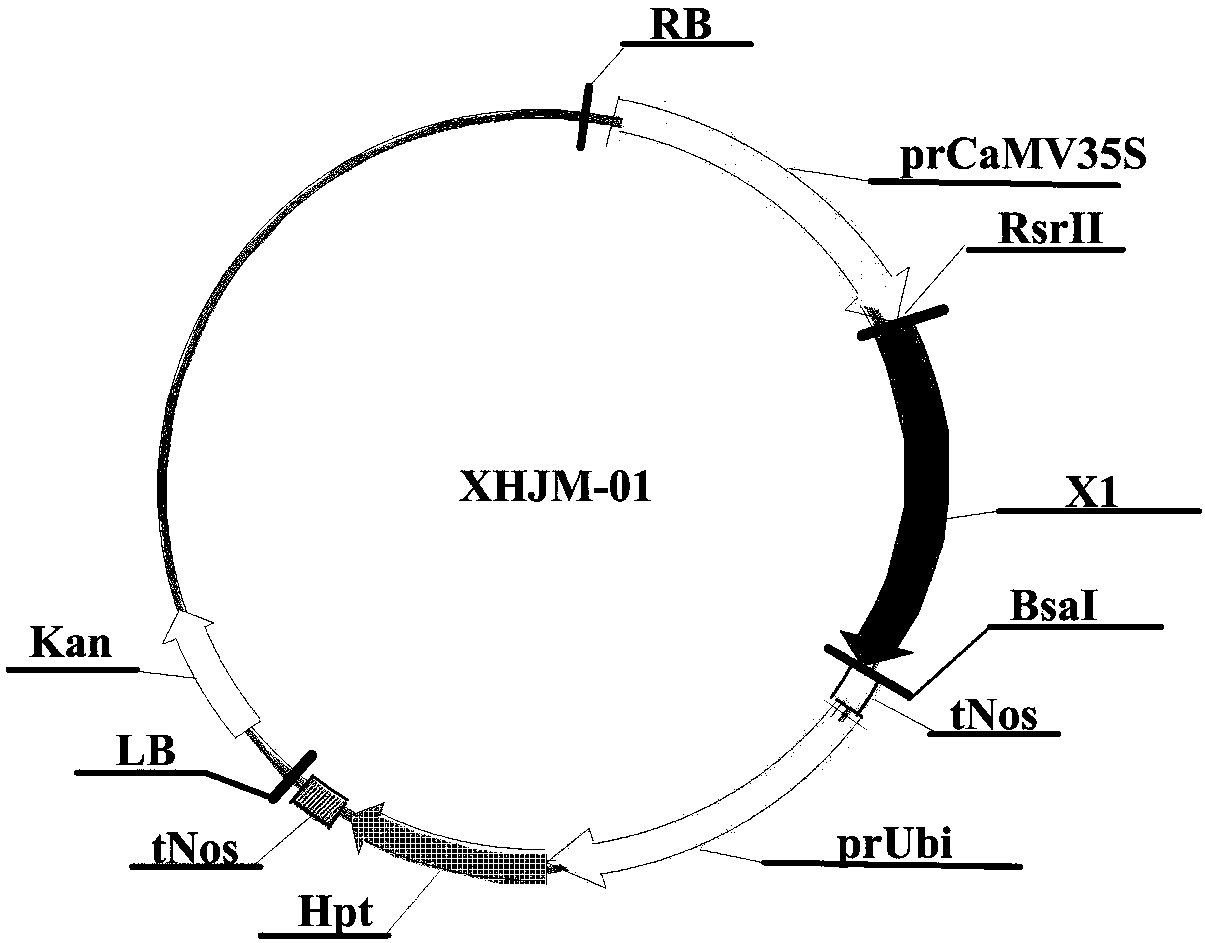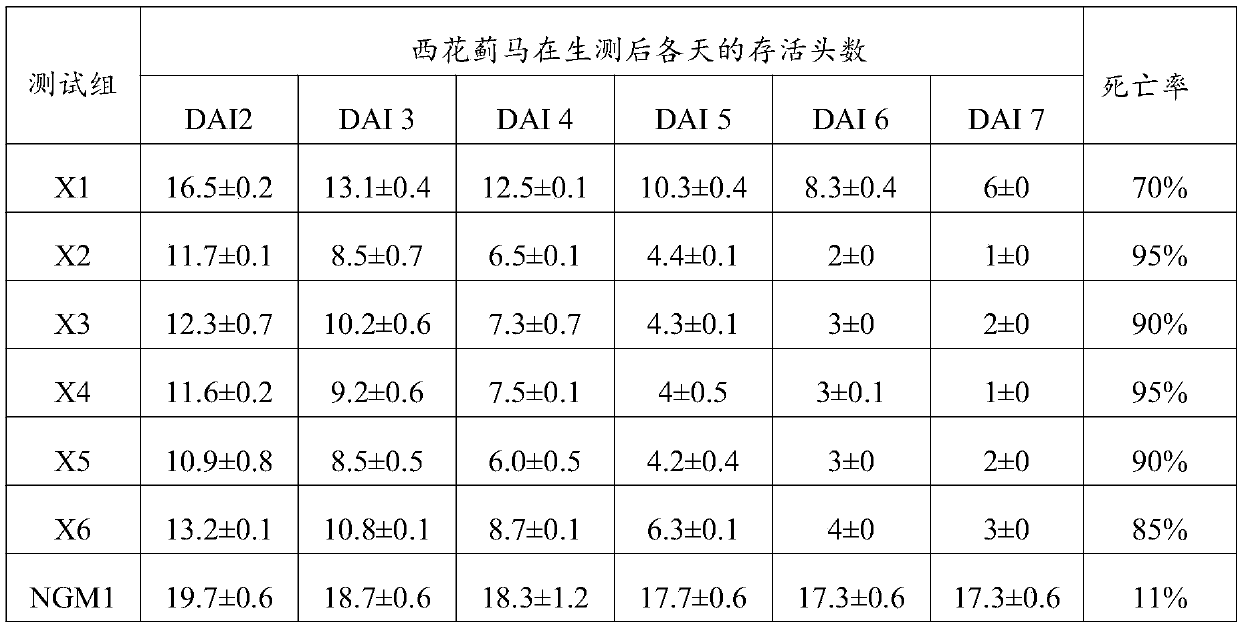A polynucleotide sequence composition used for pest control
A polynucleotide and composition technology, applied in the application, insecticide, animal repellent, etc., can solve the problems of many beneficial organisms, slow degradation, non-target biological damage, etc., and achieves good environmental compatibility and operation. Simple, avoids the effect of resistance
- Summary
- Abstract
- Description
- Claims
- Application Information
AI Technical Summary
Problems solved by technology
Method used
Image
Examples
Embodiment 1
[0025] Embodiment 1, determination of target sequence
[0026] Step 1. Extracting total RNA of Thrips occulus: Extract RNA from larvae of Thrips larvae by conventional Trizol method, purify by conventional methods, and treat with DNase to obtain concentration ≥ 280 ng / μl, total amount ≥ 10 μg, OD 260 / 280 1.9-2.1 for total RNA samples.
[0027] Step 2. Isolate mRNA and synthesize cDNA: use oligo-dT magnetic beads to isolate mRNA with polyA, and then use random hexamers and Invitrogen kits to synthesize the first strand of cDNA.
[0028] Step 3: Screen out the target sequence, compare with NCBI, and screen out 6 target sequences of Western flower thrips from various metabolic pathways through research and analysis. The corresponding GENBANK accession number is: GT301184, GenBank: GT308845.1 specific information As follows:
[0029] Target sequence 1: GTTACGCTAACGGTCAAATG (SEQ ID NO: 1)
[0030] Target sequence 2: AATGCCTCCTGATTTTGCCAAT (SEQ ID NO: 2)
[0031] Target sequence...
Embodiment 2
[0035] Embodiment 2, the construction of plant expression vector
[0036]According to tomato Ubi promoter-target sequence sense strand-spacer sequence-target sequence antisense strand are connected together, and form expression vector with marker gene Hpt. Both ends of the sense primer have EcoR I and Hind III restriction sites, the antisense primers have Xho I and Sac I restriction sites at both ends, and the spacer primers have Hind III and Sac I restriction sites at both ends site. The recombinant cloning vector containing the sense strand was double-digested, and the sense strand fragment was recovered. The recombinant expression vector XHJM was subjected to the same double digestion to recover the linearized plasmid, and ligated with the target fragment to obtain the recombinant expression vector XHJM-X1. The recombinant expression vector XHJM-X1 was double digested, and the linearized plasmid was recovered. The recombinant cloning vector containing the antisense stran...
Embodiment 3
[0038] Embodiment 3, obtaining transgenic tomato
[0039] The correct recombinant expression vectors XHJM-01, XHJM-02, XHJM-03, XHJM-04, XHJM-05 and XHJM-06 were transformed into Agrobacterium EHA105 (Invitrgen, Chicago, USA, CAT: 18313-015), according to the commonly used Agrobacterium infection method, the tomato seedlings cultured aseptically were co-cultured with the Agrobacterium described in the third embodiment, so that the recombinant expression vector XHJM- 01, T-DNA in XHJM-02, XHJM-03, XHJM-04, XHJM-05 and XHJM-06 (including X1 nucleotide sequence, X2 nucleotide sequence, X3 nucleotide sequence, X4 nucleotide sequence sequence, X5 nucleotide sequence, X6 nucleotide sequence, maize Ubi promoter sequence, Hpt gene and Nos terminator sequence) were transferred into the tomato genome, and tomato plants and transgenic plants with X1 nucleotide sequence were obtained. Tomato plant with X2 nucleotide sequence and tomato plant with X3 nucleotide sequence, tomato plant with...
PUM
 Login to View More
Login to View More Abstract
Description
Claims
Application Information
 Login to View More
Login to View More - R&D
- Intellectual Property
- Life Sciences
- Materials
- Tech Scout
- Unparalleled Data Quality
- Higher Quality Content
- 60% Fewer Hallucinations
Browse by: Latest US Patents, China's latest patents, Technical Efficacy Thesaurus, Application Domain, Technology Topic, Popular Technical Reports.
© 2025 PatSnap. All rights reserved.Legal|Privacy policy|Modern Slavery Act Transparency Statement|Sitemap|About US| Contact US: help@patsnap.com



